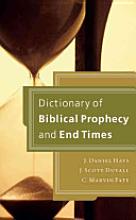J. Daniel Hays, J. Scott Duvall, and C. Marvin Pate. Dictionary of Biblical Prophecy and End Times. Grand Rapids, Mich.: Zondervan, 2007. $29.99 HB, $14.99 Kindle
This handbook on Bible Prophecy was written by three professors at Ouachita Baptist University in Arkansas. At 512 pages including indices, the book is manageable for laymen but has enough depth to be useful for the busy pastor. Despite the fact that the authors state that they “do not agree” on all issues in the field of biblical prophecy, this is a fairly homogenous book. While articles will fairly describe other views, the articles are clearly pre-millennial and occasionally dispensational. This is not a surprise given the fact that Duvall and Hays were educated at Southwestern Baptist Theological Seminary and Pate has represented progressive dispensationalism in other books on biblical prophecy. This is not a criticism of the text, but it does tend to narrow the target audience more than a collection of essays from scholars representing several viewpoints.
One pointed criticism: the articles are unsigned. I realize there are only three contributors, but at the very least I would like to have seen initials at the end of the article to indicate the author. Perhaps this is a personal annoyance, but I find an article far more useful if I can cite the author by name.
There are some excellent articles in this volume which deserve attention. The sixteen page article on the book of Revelation is a good introduction to the genre, purpose and intention of Revelation. Various interpretive methods are discussed in separate articles, as are views on the millennial and rapture. Articles on millennialism, tribulation, and the four beasts of Daniel were all well written and useful. The article on the People of God was particularly well balanced.
I appreciate the inclusion of a number of articles on Second Temple Period apocalyptic. The article on Apocalyptic is a nicely balanced approach and has brief descriptions of most of the literature. There is a separate article on the Parables of Enoch, but nothing on the rest of 1 Enoch. Articles on Second Baruch and Fourth Ezra would have been valuable for students working in Revelation. But these go beyond the goal of “biblical prophecy” and may not have been included for that reason.
 A few articles strike me as strange topics to include. Some concern biblical prophecy but only as it is formally defined. For example, Iddo the Prophet, Huldah the Prophetess and Miriam have short articles despite the fact that the have nothing to say on the topic of “end times.” There is a nice article on poetry in the Bible, although there is little in the article which bears directly on biblical prophecy. I found the articles on the “Club of Rome Conference,” the European Union, and Bible Codes somewhat useless if the goal of the book was to provide a handbook on biblical prophecy.
A few articles strike me as strange topics to include. Some concern biblical prophecy but only as it is formally defined. For example, Iddo the Prophet, Huldah the Prophetess and Miriam have short articles despite the fact that the have nothing to say on the topic of “end times.” There is a nice article on poetry in the Bible, although there is little in the article which bears directly on biblical prophecy. I found the articles on the “Club of Rome Conference,” the European Union, and Bible Codes somewhat useless if the goal of the book was to provide a handbook on biblical prophecy.
My usually critique of dictionaries like this is “how would I use a book like this?” Articles in a dictionary like this are selected by the editors because they are significant, but no dictionary can contain entries for all of the topics which may arise in studying prophecy. I think that most layman and not a few pastors will find this book a handy guide to the books of Daniel and Revelation and related topics, but the limited articles make me think that the Dictionary of Biblical Prophecy and End Times would be better titled “A Handbook.”